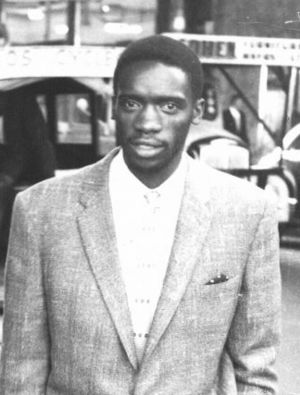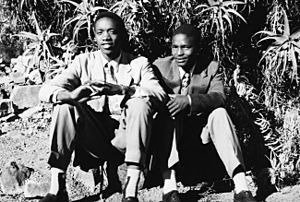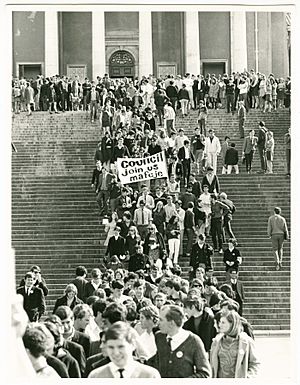Archie Mafeje facts for kids
Quick facts for kids
Archie Mafeje
FAAS
|
|
|---|---|

Archie Mafeje in Adderley Street, Cape Town in August 1961
|
|
| Born |
Archibald Boyce Monwabisi Mafeje
30 March 1936 Gubenxa village, Ngcobo (Thembuland), Cape Province, Union of South Africa
|
| Died | 28 March 2007 (aged 70) |
| Resting place | Ncambele village, Tsolo |
| Citizenship |
|
| Education | Nqabara Secondary School Healdtown Comprehensive School University of Cape Town (BA, MA) King's College, University of Cambridge (PhD) |
| Known for | Mafeje Affair Anti-apartheid movement Decolonisation of African anthropology |
| Spouse(s) | Shahida El Baz |
| Scientific career | |
| Fields | Social anthropology Political Anthropology Urban Sociology African history |
| Institutions | University of Dar Es Salaam Institute of Social Studies CODESRIA University of Namibia American University in Cairo |
| Thesis | Social and Economic Mobility in a Peasant Society: A Study of Commercial Farmers in Buganda (1968) |
| Doctoral advisor | Audrey Richards |
| Other academic advisors | Monica Wilson (MA) |
Archibald Boyce Monwabisi Mafeje (born March 30, 1936 – died March 28, 2007), known as Archie Mafeje, was a South African anthropologist and activist. He was born in the Cape Province, which is now the Eastern Cape in South Africa. He earned his degrees from the University of Cape Town (UCT) and Cambridge University.
Archie Mafeje became a professor at universities in Europe, the Americas, and Africa. However, he spent most of his career outside South Africa. This was because he was prevented from teaching at UCT due to the country's apartheid laws. Apartheid was a system of racial segregation and discrimination that was enforced by the government in South Africa from 1948 to 1994.
Mafeje was a strong opponent of apartheid, even while living in exile (away from his home country). He was an important Pan-African thinker who studied African history and anthropology. He believed that old, biased Western ideas should be removed from the study of Black African cultures. He pushed for the decolonization of African anthropology. This meant challenging how anthropology had been used to support colonialism and ideas of racial hierarchy.
Contents
Life and Career
Early Life and Education
Archibald Boyce Monwabisi Mafeje was born on March 30, 1936. He grew up in Gubenxa, a small village in the Cape Province of South Africa. His father, Bennett, was a school headmaster, and his mother, Frances Lydia, was a teacher. Archie was the oldest of seven children.
In the early 1950s, Mafeje attended Nqabara Secondary School. There, the headmaster, Nathaniel Honono, taught him about politics and the Non-European Unity Movement. This school was considered one of the best for black students in South Africa. However, the apartheid government took it over in 1956.
Mafeje then went to Healdtown Comprehensive School in 1954. Famous people like Nelson Mandela and Robert Sobukwe also went there. At Healdtown, Mafeje became very interested in politics. He joined the University of Fort Hare in 1955 to study zoology but left after a year.
In 1957, Mafeje enrolled at the University of Cape Town (UCT). At first, he studied biology, but he found that some of his professors held racist views. He then switched to studying social anthropology in 1959. He earned a Bachelor of Arts degree in Urban Sociology and a Master of Arts (MA) in Political Anthropology. While at UCT, he was part of student groups like the Society of Young Africa (SOYA). He often had political debates with other students.
For his master's project, Mafeje studied the Langa township in South Africa. His supervisor, Monica Wilson, helped turn his work into a book. Later, Mafeje felt that the book had some problems because it used ideas that were too focused on Europe.
In 1963, Mafeje was briefly detained for speaking at an illegal gathering. After this, he moved to the United Kingdom. He became a research assistant at the University of Cambridge and later earned his PhD from King's College, Cambridge. For his PhD, he lived in Uganda and studied African farmers.
The Mafeje Affair
In 1967, Mafeje applied for a senior teaching job at the University of Cape Town (UCT). The university offered him the position. However, the South African government threatened to cut UCT's funding if they hired a non-white professor. Even though the law didn't directly stop UCT from hiring non-white staff, the university council decided to withdraw Mafeje's job offer.
This decision made UCT students very angry. On August 15, 1968, they held a sit-in protest to demand that the university change its mind. This protest gained international attention and was seen as part of the worldwide protests happening in 1968. However, the protest ended when counter-protesters attacked the building.
After this event, known as the Mafeje Affair, Mafeje left South Africa to work abroad. Years later, in the early 1990s, UCT offered him the same senior lecturer position again. But Mafeje, who was already a well-known professor, turned it down, saying the offer was "demeaning."
In 2002, UCT's Vice-Chancellor, Njabulo Ndebele, reopened the discussion about the Mafeje Affair. In 2003, UCT officially apologized to Mafeje and offered him an honorary doctorate. He did not respond to the offer. In 2008, after Mafeje had passed away, UCT formally apologized to his family, and they accepted.
Academic Career
In 1969, Mafeje became a senior lecturer and later a professor at the University of Dar Es Salaam in Tanzania. After an accident in 1971, he moved to Europe for surgery. From 1972 to 1975, he led a program at the Institute of Social Studies, where he met Shahida El-Baz, who later became his wife. In 1973, at age 36, he was appointed "Queen Juliana Professor" in the Netherlands and became a Dutch citizen. He was one of the first Africans to receive this honor.
Mafeje also helped create the Council for the Development of Social Science Research in Africa (CODESRIA) in 1973. He became a professor at the American University in Cairo (AUC) in 1978 and again in 1994. He was known for not giving his students tests, preferring essays instead. His daughter Dana said he believed "exams are for stupid people."
Mafeje worked as a visiting fellow at various universities, including Northwestern University in the United States. In 1993, he was chosen to lead the Multidisciplinary Research Center at the University of Namibia. However, his time there was difficult due to racism, and he eventually returned to Cairo in 1994.
Throughout his career, Mafeje also worked as a consultant for the Food and Agriculture Organization (FAO). In 2000, after more than 30 years in exile, Mafeje returned to South Africa. He became a Senior Research Fellow at the National Research Foundation.
Personal Life and Death
Mafeje married Nomfundo Noruwana in 1961, and they had a son named Xolani. They later divorced. In 1977, Mafeje married Shahida El-Baz. They had four children: Nandipha, Lumko Nkanyuza, Lungisa Nkanyuza, and Dana. Mafeje converted to Islam before marrying Shahida, as she was Muslim.
In his later years, Mafeje described himself as "South African by birth, Dutch by citizenship, Egyptian by domicile, and African by love." He died in Pretoria, South Africa, on March 28, 2007. He was buried in Ncambele village, next to his parents.
Personality
Archie Mafeje was seen by his colleagues as an independent thinker. His students sometimes found him challenging because he "did not suffer fools gladly," meaning he had little patience for people he thought were not smart or serious.
Activism, Research, and Ideas
Anti-Apartheid and Marxism
Mafeje was part of groups like SOYA and the African Peoples' Democratic Union of Southern Africa (APDUSA). These groups later became the Non-European Unity Movement. They believed in not working with the oppressive government and fought for full democratic rights for all people. Mafeje believed that workers and landless farmers could bring about revolution.
Mafeje greatly admired leaders like Lenin and Mao. He was an anti-apartheid activist who lived in exile. He often disagreed with some white members of the South African Communist Party, accusing them of having "white superiority" ideas.
Decolonization of African Identity
As an important Pan-African thinker, Mafeje studied and wrote about African history and anthropology. He published influential essays and books on development, farming societies, politics, and how knowledge about Africa is created. He is considered one of the leading modern African anthropologists.
Mafeje's work greatly helped in the decolonization of African identity and its history. He criticized the ways anthropology, a field that studies human societies and cultures, had been too focused on European ideas. He demanded that imperialist and Western ideas be removed from the study of Black African cultures. This led to a closer look at the basic ideas of anthropology and how scholars studied people they considered "the other."
He was one of the first to work on breaking down the idea of "tribalism" in Africa. His work included many debates with other scholars. Mafeje believed that "white" anthropology was problematic because it was based on studying "otherness," which he felt led to racism and apartheid, as seen in South Africa. He argued that colonial anthropology separated the white anthropologist (the subject) from Africans (the object).
Mafeje is seen as one of Africa's most important thinkers who combined his academic work with his experiences as an oppressed black person. After he passed away, his work became even more popular among other African scholars.
Awards and Honours
Mafeje was chosen as a Fellow of the African Academy of Sciences in 1986. He received an Honorary Life Membership of CODESRIA in 2003 and was named a CODESRIA Distinguished Fellow in 2005.
In 2008, the University of Cape Town (UCT) gave Mafeje an honorary doctorate in Social Science after his death. They also created a scholarship in his honor and renamed a meeting room the Mafeje Room. UCT also established the Archie Mafeje Chair in Critical and Decolonial Humanities. In 2010, Walter Sisulu University also awarded him an honorary doctorate. The Tiso Foundation created the Archibald Mafeje PhD Scholarship in 2014. The Africa Institute of South Africa (AISA) started the Archie Mafeje Annual Memorial Lecture series in 2016. The University of South Africa established the Archie Mafeje Institute for Applied Social Policy Research (AMRI) in 2017.
See Also
- Mafeje Affair
Images for kids





